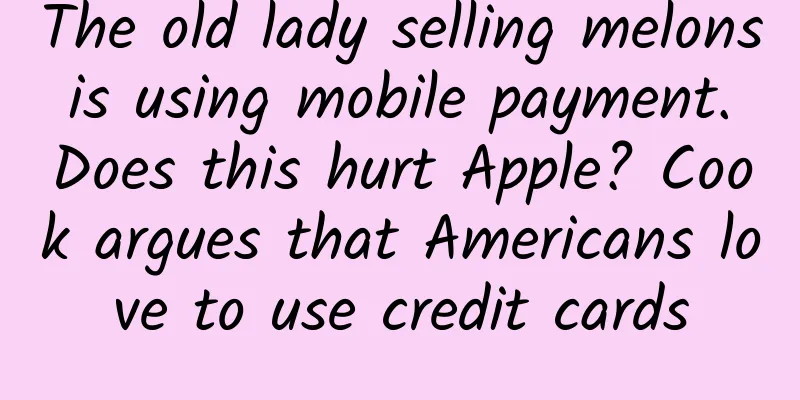The old lady selling melons is using mobile payment. Does this hurt Apple? Cook argues that Americans love to use credit cards

|
Apple CEO Tim Cook recently visited Beijing and appeared at the "China Development Forum 2017" yesterday morning. Throughout the conversation, Cook felt the superiority of being Apple's CEO, but when talking about the topic of mobile payment, Cook felt embarrassed and awkward for the first time. At that time, Qian Yingyi, Dean of Tsinghua University School of Economics and Management, casually cited an example of mobile payment that is now ubiquitous in China: I remember one thing very clearly. I was walking on the Tsinghua campus once and saw an old lady selling watermelons there. She used mobile payment. It touched me deeply at the time. You may not see this kind of scene in the United States, and you may not see this kind of scene in other places. How do you expect Cook to answer such a sensitive question? But Cook was also very smart. He immediately said: "This is a good thing. She doesn't have to worry about whether she has enough change to make the change, and she doesn't have to worry about whether the money I receive is safe." Haha, Cook is really extraordinary. He actually stood in the perspective of an old Chinese lady and put himself in her shoes to imagine why she would choose mobile payment instead of cash! Of course, Cook also politely praised this kind of scene that is basically impossible to see on American streets: "I think these small daily events are actually very significant. I especially appreciate China's foresight in this regard, seeing the potential and moving forward quickly." Qian Yingyi further mentioned that China's mobile payment development is very vigorous, even surpassing the progress in this regard in the United States and Europe, and asked Cook what his comment was? Cook said that this is mostly due to traditional reasons, that is, Americans and Europeans are more accustomed to using credit cards in daily life! He even used the phrase "It is easy to change the country, but difficult to change one's nature" to describe this habit of Europeans and Americans! Cook said: "In the United States or Europe, they are already accustomed to using credit cards. It is difficult to change a person's nature, so in Europe and the United States, many people will involuntarily take out their credit cards from their wallets and swipe them. It has become a habit. American merchants are also reluctant or slow to adopt mobile payments." As for why mobile payment is developing so rapidly in China, Cook has this view: "Some small businesses or start-ups in China are very active in this area, and I think people in China are more willing to accept changes and better things, so China is ahead in the field of mobile payment. Mobile payment can be used anywhere in China, but in the United States, it may be okay in Silicon Valley, but if you go to the heartland of the United States, basically they don't know what mobile payment is." In fact, when it comes to mobile payment, Cook is talking about his pain point. As early as October 20, 2014, Apple launched its mobile payment Apple Pay in the United States, and entered China on February 18, 2016. However, to this day, whether in the US market or the Chinese market, the number of Apple Pay users and market share are low, which makes Apple feel very embarrassed! Why are WeChat Pay and Alipay so popular in China, but Apple Pay is so unpopular in China? The reason is nothing more than Apple Pay's closedness and inconvenience in use. You should know that Apple Pay only supports Apple's own iPhone, and it must be iPhone 6 or later. Apple Pay currently does not support Android phones, which have a larger market share and a larger number of smartphones in China, including Samsung, Huawei, Xiaomi, OPPO, vivo, etc. This has largely lost most of the Chinese users. On the other hand, Apple Pay is a mobile payment function based on NFC. It not only requires the smartphone itself to support NFC (iPhone is no problem of course), but also requires the payee to provide the corresponding NFC device. After configuration and setting, mobile payment can be made. This alone has determined that the payee can only be a merchant, and it is definitely impossible for an individual! Even for merchants, this will also increase equipment and costs. It is not easy to lay out in tens of millions of merchants in China. Think about it, Alipay and WeChat only need to scan a QR code to complete the payment, whether it is for merchants or individuals, such a convenient way, plus Alipay and WeChat have hundreds of millions of installations, almost everyone has them on their phones, who would bother with the troublesome Apple Pay? Therefore, Apple's Apple Pay's failure in China is inevitable! As a winner of Toutiao's Qingyun Plan and Baijiahao's Bai+ Plan, the 2019 Baidu Digital Author of the Year, the Baijiahao's Most Popular Author in the Technology Field, the 2019 Sogou Technology and Culture Author, and the 2021 Baijiahao Quarterly Influential Creator, he has won many awards, including the 2013 Sohu Best Industry Media Person, the 2015 China New Media Entrepreneurship Competition Beijing Third Place, the 2015 Guangmang Experience Award, the 2015 China New Media Entrepreneurship Competition Finals Third Place, and the 2018 Baidu Dynamic Annual Powerful Celebrity. |
<<: Tesla Autopilot may cause another accident with minor injuries to the occupants
>>: Sogou Maps Intelligent Co-pilot Launches New Direction for AI
Recommend
Keep your budget the same, and these two tricks will double the effectiveness of your account promotion!
Many advertisers will control their budgets very ...
Tesla's "free" marketing secrets
What is Tesla's strength? What made it succes...
Operational Strategy Analysis | How does Keep's "Lightweight Operation Technique" achieve great results?
The trend of sports is prevalent, and every produ...
Before the advent of carnations, what flowers did ancient people use to represent mothers?
Last December, I went to Suzhou with a friend. Wh...
Tips for placing Tencent Guangdiantong graphic and text information flow ads!
Tencent has a lot of advertising resources, so th...
How much does it cost to join the Zibo Second-hand Car Mini Program?
Is it easy to join the Zibo Second-hand Car Mini ...
Taking APP as an example, let’s share a data idea of advertising placement
The three core indicators of product operation ar...
China Passenger Car Association: Pickup Truck Manufacturers Wholesale Sales Ranking in May 2024
In May 2024, the pickup truck market sold 45,000 ...
How to attract traffic to hairy crabs on Zhihu?
Get 5000+ customers at 0 cost, how does Daxiex at...
“Double 11” is approaching, beware of this dangerous action after opening the express package!
In this fast-paced era, online shopping has becom...
New marketing method for increasing followers on Xiaohongshu
If you often browse Xiaohongshu, do you have this...
How did Facebook get to 2 billion users? The answer is "science" and "empathy"
Yesterday afternoon, Zuckerberg said more than 65...
Scientists develop insect field monitoring device that preserves high-quality DNA
Have you ever seen a collection device filled wit...









